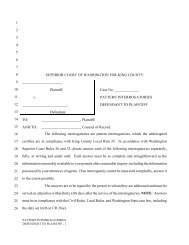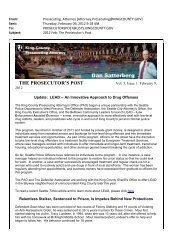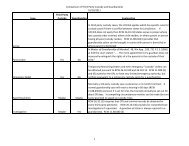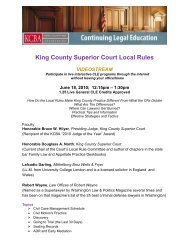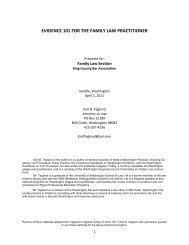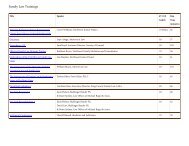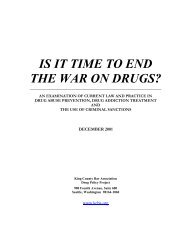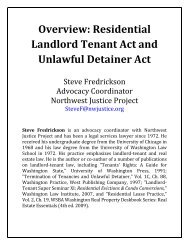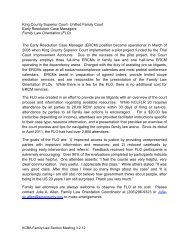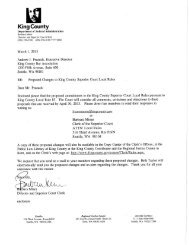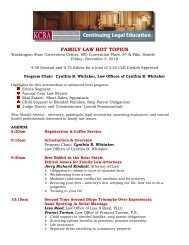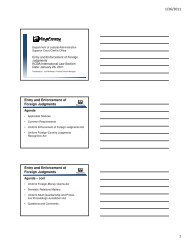Effective Drug Control: Toward A New Legal Framework
Effective Drug Control: Toward A New Legal Framework
Effective Drug Control: Toward A New Legal Framework
Create successful ePaper yourself
Turn your PDF publications into a flip-book with our unique Google optimized e-Paper software.
554 Lynn Baker (2002), “Should Liberals Fear Federalism?” 2001 William Howard Taft Lecture on<br />
Constitutional Law, 70 U. CINN. L. REV. 433.<br />
555 Id.<br />
556 See David Osborne (1990), Laboratories of Democracy, Cambridge: Harvard Business School Press.<br />
Beyond merely allowing states more latitude in drug policy, “it might be feasible for different jurisdictions<br />
to set up some natural experiments by adopting different specific regulations within a broad pattern of<br />
liberalization. In that way, we could soon anticipate quasi-scientific evaluation of the outcomes, valuable<br />
information that could eventually serve as substantive data for making more confident choices among<br />
alternatives in terms of public health and social welfare, as well as efficiency and efficacy.” Dwight B.<br />
Heath (1992), “U.S. <strong>Drug</strong> <strong>Control</strong> Policy: A Cultural Perspective,” in Political Pharmacology: Thinking<br />
About <strong>Drug</strong>s, Cambridge, MA: Proceedings of the American Academy of Arts and Sciences, v.121, no.3, p.<br />
288.<br />
557 See Erich Goode (2005), <strong>Drug</strong>s in American Society, 6th ed., <strong>New</strong> York: McGraw-Hill, ch. 4.<br />
558 See Editors (2003), “Steamroller Ashcroft,” The Economist, May 3, 2003.<br />
559 Alexander Hamilton (1788), “The Federalist No. 17,” in The Federalist, Edward Mead Earle, intro.<br />
(1937), op. cit., p. 103.<br />
560 David Marion, Director of the Wilson Center for Leadership in the Public Interest at Hampden-Sydney<br />
College, argues, “A persuasive ‘quality of life’ argument can be made for reserving a major role for the<br />
states in our constitutional system. Leaving important responsibilities with the states provides the<br />
American people with many opportunities to become ‘big fish in little ponds.’ In addition to promoting<br />
good civic virtues, decentralized decision-making improves the likelihood governmental decisions will<br />
address the real (not just perceived) needs of the people. David Marion, (2005), “Body and Soul of<br />
Federalism,” Washington Times, January 16, 2005.<br />
561 Pub. L. 91-513, title II, s 708, Oct. 27, 1970, 84 Stat. 1284, section fully cited, supra, at p. 7.<br />
562 Daniel K. Benjamin & Roger Leroy Miller (1991), op. cit., p. 266.<br />
563 David W. Rasmussen & Bruce L. Benson (2003), “Rationalizing <strong>Drug</strong> Policy Under Federalism,” 30<br />
FLA. ST. U. L. REV. 728-29.<br />
564 Id. at pp. 730-32.<br />
565 Daniel K. Benjamin & Roger Leroy Miller (1991), op. cit., p. 265. See State v. Lee, 382 P.Ed. 491, 62<br />
Wash.2d 228 (1963); and City of Seattle v. Ross, 344 P.2d 216, 54 Wash.2d 655 (1959).<br />
566 By 1927, after a little more than seven years of alcohol prohibition, only eighteen U.S. states were still<br />
funding their share of the enforcement of the Volstead Act and the Eighteenth Amendment. David L.<br />
Teasley (1992), “<strong>Drug</strong> <strong>Legal</strong>ization and the ‘lessons’ of Prohibition,” Contemporary <strong>Drug</strong> Problems,<br />
Spring 1992, p. 34, citing the historian J.C. Burnham.<br />
567 <strong>New</strong> York v. United States, 505 U.S. 144, 166 (1992). Where Congress has authority under the U.S.<br />
Constitution to pass laws requiring or prohibiting certain acts, it lacks the power directly to compel the<br />
states to require or prohibit those acts. Reno v. Condon, 528 U.S. 141, 149 (2000).<br />
568 Printz v. United States, 521 U.S. 98 (1997).<br />
569 In Oregon v. Ashcroft, 192 F.Supp.2d 1077 (D.Or. 2002), the Ninth Circuit enjoined the U.S. Justice<br />
Department from attempting to use the <strong>Control</strong>led Substances Act to halt the implementation of Oregon’s<br />
“Death with Dignity Act.” The U.S. Supreme Court granted a writ of certiorari on February 22, 2005 on<br />
the federal challenge to the lower court decision and will hear arguments in Gonzales v. Oregon, No. 04-<br />
623, in the upcoming term.<br />
570 See Prefatory Note to the Uniform <strong>Control</strong>led Substances Act (1970), U.L.A. vol. 9, part IV, p. 645.<br />
571 The Association of American Physicians and Surgeons’ counsel stated: “The war on drugs has turned<br />
into a war on doctors … and the suffering patients who need to drugs to attempt anything approaching a<br />
normal life …. Physicians are being threatened, de-licensed and imprisoned for prescribing in good faith<br />
with the intention of relieving pain.” quoted in Joe Cantlupe and David Hasemyer (2004), “Painful remedy?<br />
Patients, advocates and government spar over tighter controls on painkillers,” San Diego Union-Tribune,<br />
September 28, 2004.<br />
572 The concept of states’ authority over medical practice, articulated in Linder v. U.S., 268 U.S. 5, 18<br />
(1925), which limited federal power under the Harrison Narcotic Act of 1914, is still a valid legal principle.<br />
573 Whalen v. Roe, 429 U.S. 589 (1977); See also Maryland v. Wirtz, 392 U.S. 183, 193. (1968).<br />
574 See summary of drug prescription programs in Part II, supra, “International Trends in <strong>Drug</strong> Policy:<br />
Lessons Learned from Abroad,” pp. 42-46.



